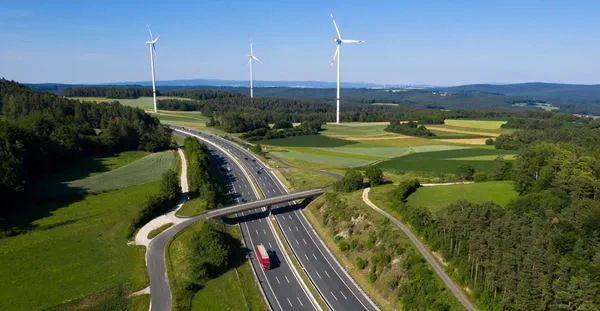With thanks to our contributors:
Joanna Plaisant, Strategic Partnership and Sustainability Director I ESG Lead
Simon Swan, Global Solution Director, New Mobility
Jeanke van der Haar, Head of Urban Energy Solutions, Netherlands
Doug Parker, Energy Transition Technologies Practice Group Lead
Lisa Micheletti Cope, Global Market Sector Director, Energy & Resources
2024 is a big political year in many parts of the world, with energy transition, security and net zero being big topics for various candidates promising billions in commitments in support of the carbon agenda. Yet, real progress at the pace needed in energy transition and decarbonization will need more than government commitments alone. Every country, every sector, and every business must join the fight to prevent the worst effects of climate heating.

Many businesses have individually made strong commitments and are already making good progress in the transition to a low carbon future. They are taking steps to understand the concerns from their communities, customers, and stakeholders. But to truly decarbonize at pace and in a way that’s equitable for all, a siloed approach can only get us so far.
Here we lay out how Arcadis can help clients leverage the advantages of working collaboratively to navigate this new landscape at every stage of the decarbonization process.
Cities are key
Our cities are often seen as the biggest polluters, consuming over two-thirds of the world’s energy according to a 2021 IEA report. But their wealth of resources and interconnectivity also provide the greatest opportunities. Cities can be hubs of innovation for a sustainable future, with the ability to test and implement multiple new technologies at scale quickly, if successful.
The EU’s recent Cities Mission program is driving this forward, with the aim of creating 100 climate-neutral and smart cities by 2030 through advice and tailor-made assistance, as well as funding and financial opportunities.

This systems-thinking approach centres around creating collaborative networks of research and information sharing that also empower citizens to contribute to the decision-making. Critically, however, buy-in across the political spectrum is required to deliver real change.
Glasgow’s Liveable Neighbourhoods demonstrates how a commitment to creating sustainable, close proximity communities creates multiple benefits when brought to life. By prioritizing walking, cycling, and public transport, we've reduced car dependency, lowered carbon footprints, and enhanced liveability, ensuring equitable and resilient urban spaces for the city’s residents.

Electrifying the grid
The elephant in the room for net zero is population expansion. By 2050, the global population is predicted to hit 10 billion, around a fifth higher than it stands today. Much of this will happen in cities, putting huge pressures on how we move people and goods around. Add in the problem of ageing infrastructure assets such as roads and bridges no longer fit for purpose, and we have a great challenge to meet even basic requirements. And that’s before we tackle the transition to a low-carbon future.
But there are solutions. Good strategic forward planning can employ digitalization, AI, digital information-sharing and the implementation of green solutions to maximize resources. Expansion and modernization of the grid will be needed to cope with electrification of buildings and mobility, and in doing so, we can build in resilience in cities.

Better city planning can also reduce car use via the introduction of pedestrian zones, congestion charging, improving the public realm and providing access to nature. Improving the connections between communities through cycleways, logistics and mobility hubs, can also create a better environment for everyone.
Not just a technological transition

To get people transitioning from traditional cars and making more use of sustainable or public modes of transport, social and behavioral change will of course also be needed. A climate agreement, net zero targets, ambitions for green jobs and growth – these won’t facilitate change if they don’t get buy-in from people across the spectrum.
The right education and engagement within our communities can help adoption of low carbon choices in everyday decisions. One such example is the City of Amsterdam’s ambition to eliminate use of natural gas by 2040.
Seeing that various stakeholders across the city would be impacted by reduced fossil fuel dependence, Amsterdam partnered with Arcadis to create a Natural Gas Free Program. As part of this, the program engaged with local communities, giving them meaningful ways to shape transition plans and the impact these plans would have on their lives.
Businesses too need to embed a low carbon culture and decision-making throughout their organizations. By adopting a ‘nature-positive’ approach (that goes beyond simply mitigating against negative impacts on the natural environment), C-Suites can lead by example for their employees.
Projects like the Amsterdam RAI shine a light on the benefits of this approach. This initiative employed an alliance of public and private bodies. The transformation of the convention center into a sustainable, multifunctional urban hub demonstrates how strategic planning and stakeholder engagement can lead to significant environmental and social benefits.
And initiatives like the Arcadis Energy Transition Academy, powered by the Lovinklaan Foundation, further support this by providing education and engagement opportunities to build a better understanding of what’s needed to progress this critical agenda, and grassroots capability and capacity.
Collaborative pathways to decarbonization
It is obvious that no one company, government, or community can solve the immense challenges of decarbonization on their own. At the heart of systems thinking is the idea that we need to recognize our own connectivity with everyone around us and understand we have a shared fate, as well as a shared opportunity.
Recent public private partnerships have signalled the political will to implement change. This, together with the right combination of strategic and technical advice, backed up by demonstratable experience can help clients match national ambitions to accelerate the delivery and investment needed.

Arcadis can get you there. With a global team of experts on the ground that are passionate about accelerating energy transition and security, we act as connectors to help match your ambitions with the right business case, investment, and capability to deliver. Together, we can achieve your decarbonization agenda at every stage of the journey.













